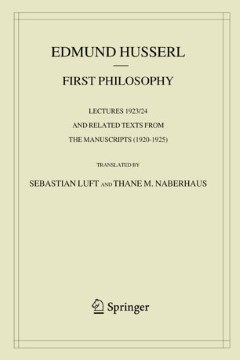World-perception and world-belief
pp. 248-262
Abstrakt
In the last lecture, we subjected the [seeming] indubitability of the world's existence owing to our continuously progressing mun- dane experience to an apodictic critique; that is, we investigated whether this indubitability was truly apodictic—whether, in other words, external experience (be it ever so carefully observing and experimenting) could ever constitute an adequate perception.What then first came to light, with respect to every perception of an indi-vidual spatial thing, was an inadequacy that was simply inescapable. It is true that in every perception the perceiver is conscious of grasping the spatial thing in question in its bodily selfhood but he is also conscious of the fact that in grasping it in this bodily way, he is not grasping it fully and wholly, according to its entire determinate content.
Publication details
Published in:
Husserl Edmund (2019) First philosophy: lectures 1923/24 and related texts from the manuscripts (1920-1925). Dordrecht, Springer.
Seiten: 248-262
DOI: 10.1007/978-94-024-1597-1_13
Referenz:
Husserl Edmund (2019) World-perception and world-belief, In: First philosophy, Dordrecht, Springer, 248–262.




